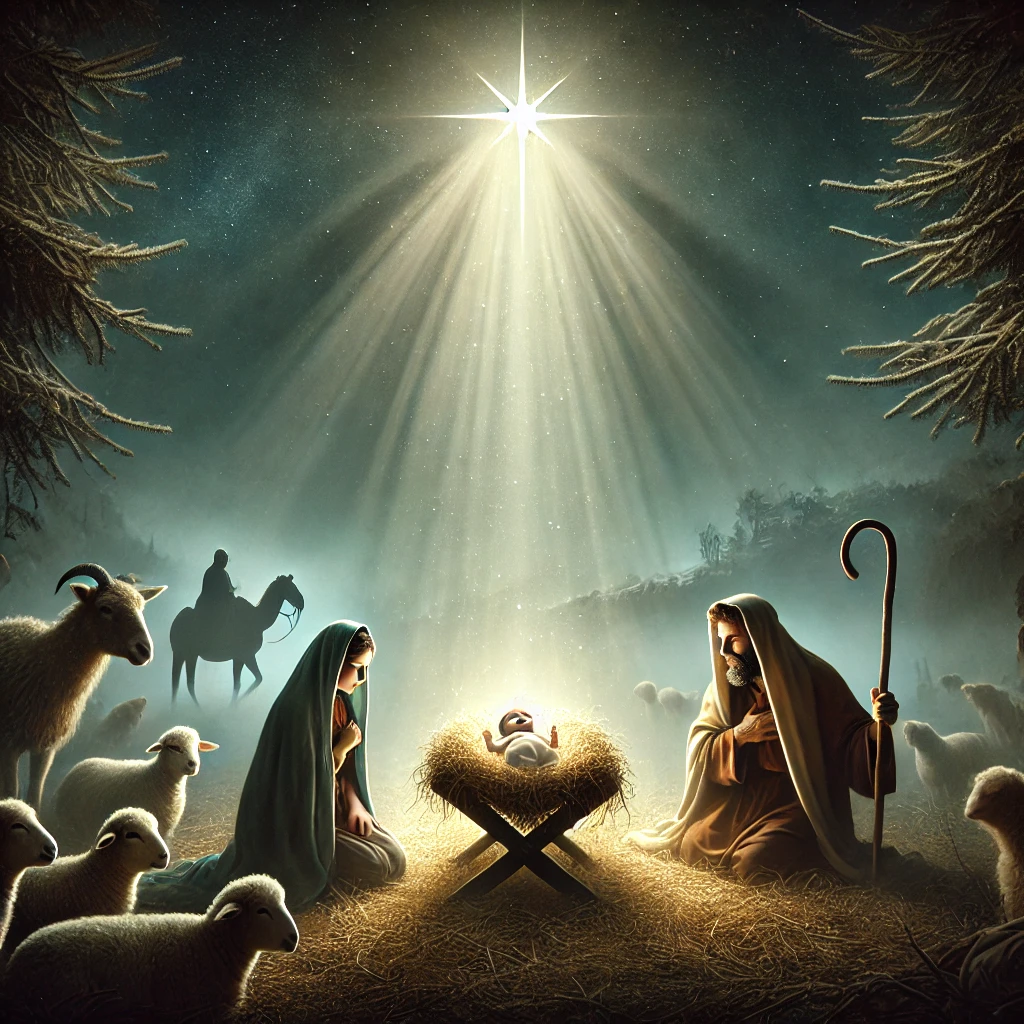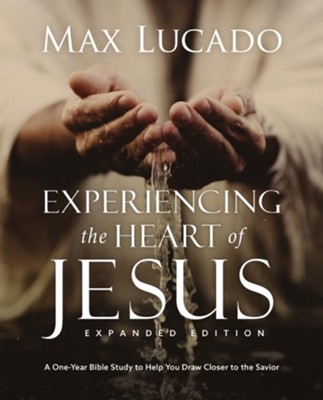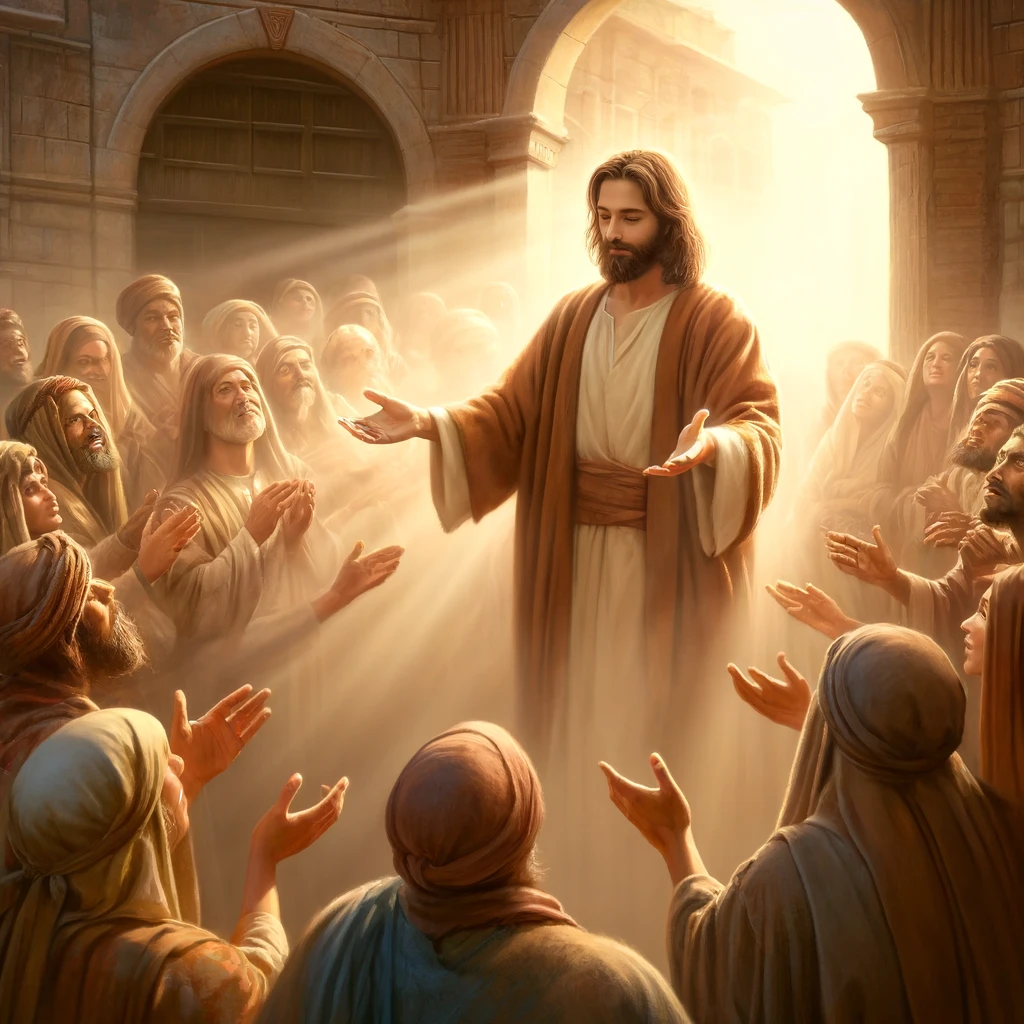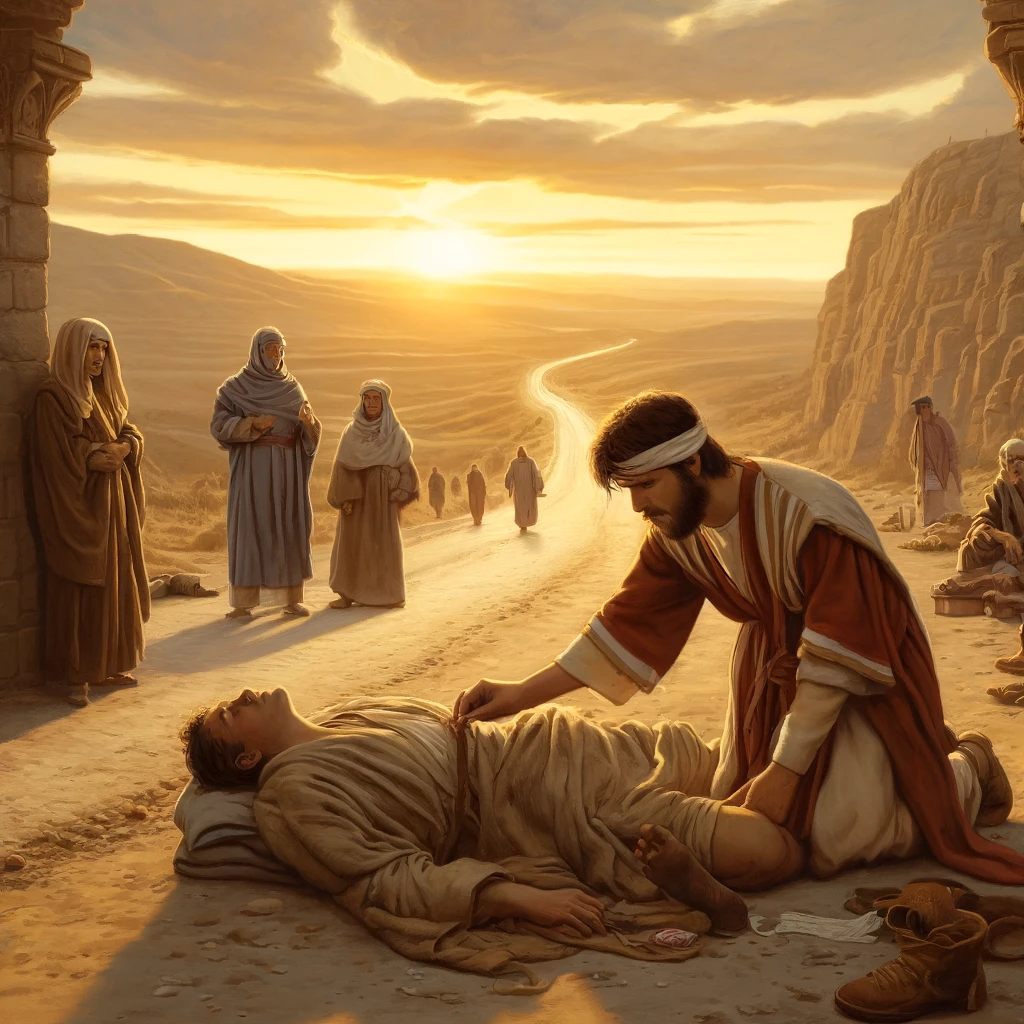The birth of Jesus is one of the most miraculous and awe-inspiring events in human history. But beyond the nativity scenes and Christmas carols, there are astonishing truths about His birth that many people don’t know. If you want to understand not just His birth, but who Jesus truly is, His mission, and His teachings, check out our in-depth guide: 👉 Who Is Jesus? The Truth About His Life and Teachings.
As believers, understanding these details helps us appreciate the depth of God’s love and strengthens our faith in Jesus as the promised Messiah. Whether you’ve grown up hearing the Christmas story or are new to exploring the significance of Jesus’ birth, these seven astonishing facts will give you a fresh perspective on the greatest birth in history.
Let’s start with a powerful truth: Jesus’ birth wasn’t random—it fulfilled centuries-old prophecies.
1. Jesus’ Birth Fulfilled Centuries-Old Prophecies

📖 “But you, Bethlehem Ephrathah, though you are small among the clans of Judah, out of you will come for me one who will be ruler over Israel, whose origins are from of old, from ancient times.” – Micah 5:2
The birth of Jesus wasn’t just a historical event—it was the fulfillment of God’s divine plan, foretold centuries before it happened. The Old Testament contains over 300 prophecies about the Messiah, and Jesus’ birth aligns perfectly with them.
Old Testament Prophecies About the Messiah’s Birth
Long before Mary was visited by the angel Gabriel, God had already revealed details about the Messiah’s coming through the prophets. Here are a few of the most striking ones:
✅ Born of a virgin – Isaiah 7:14: “The virgin will conceive and give birth to a son, and will call him Immanuel.”
✅ Born in Bethlehem – Micah 5:2: The exact location of Jesus’ birth was foretold hundreds of years before it happened.
✅ A descendant of David – Jeremiah 23:5: Jesus came from the royal lineage of King David, just as God had promised.
How Jesus’ Birth Aligns with Ancient Jewish Expectations
The Jewish people had been waiting for the Messiah for generations. They expected a powerful ruler who would deliver them from oppression. But Jesus didn’t come as a conquering king—He came as a humble child, born in a manger.
This wasn’t an accident. God’s plan was always for the Messiah to come in humility first, before returning in glory. The way Jesus was born fulfilled prophecy exactly as God intended, showing that He is the true Messiah the world had been waiting for.
Why Biblical Prophecy Strengthens Our Faith
When we see how Jesus’ birth perfectly matches what was foretold in the Old Testament, it strengthens our confidence in the truth of Scripture. No other person in history could have fulfilled these prophecies so precisely.
💡 The odds of one person fulfilling just 8 of these prophecies is 1 in 100,000,000,000,000,000! That’s a number so big, it’s impossible to imagine. And Jesus fulfilled over 300! His birth alone is a miracle that proves God’s Word is true.
✝️ Jesus wasn’t an accident—He was the fulfillment of God’s promise to save the world.
2. Jesus Wasn’t Born in a Traditional Stable
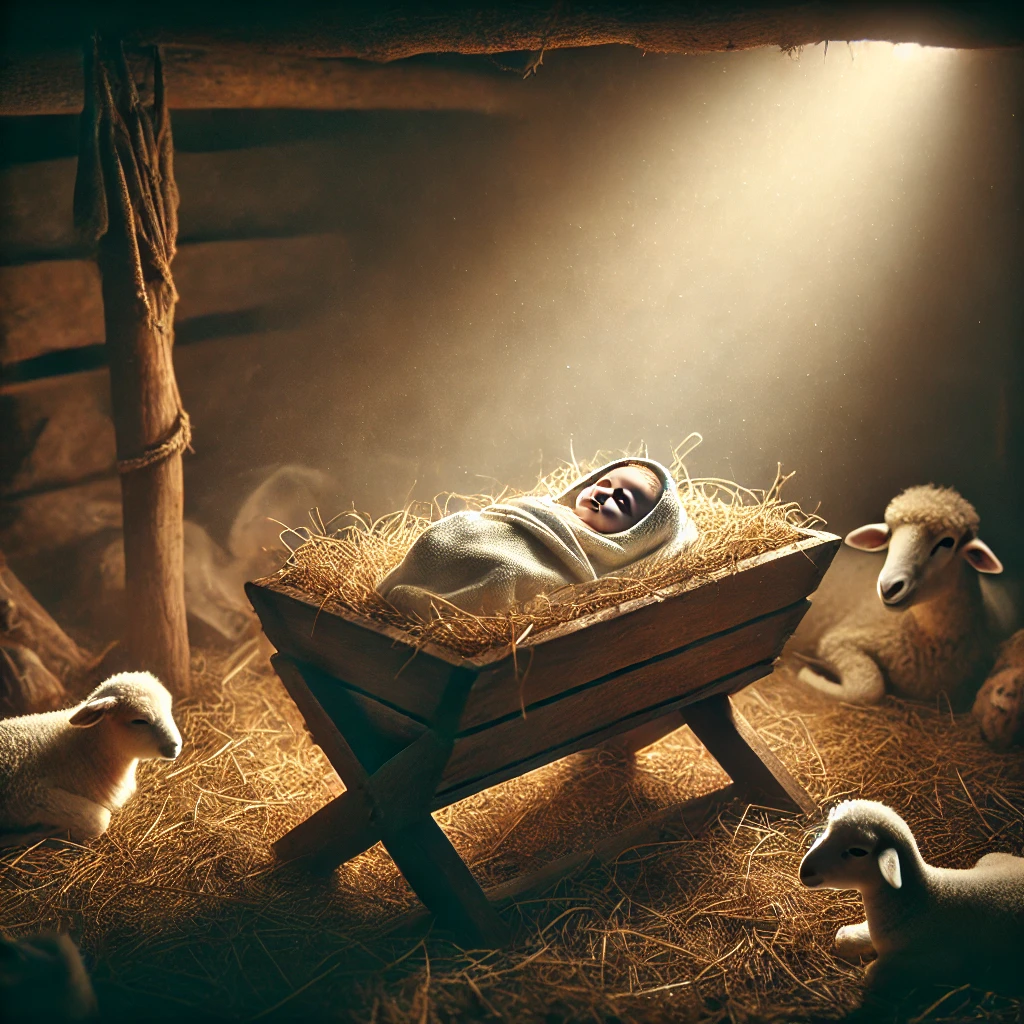
📖 “And she gave birth to her firstborn, a son. She wrapped him in cloths and placed him in a manger, because there was no guest room available for them.” – Luke 2:7
If you picture the nativity scene, you probably imagine a wooden stable, surrounded by animals, hay, and a bright star shining above. But the truth is, Jesus’ birth might not have taken place in a stable at all—at least, not in the way we typically imagine.
Many people think Mary and Joseph arrived at an inn in Bethlehem, only to be turned away because there were no rooms left. But the original Greek text of Luke 2:7 doesn’t mention an inn—it uses the word kataluma, which means “guest room”. This suggests that Jesus was likely born in a relative’s home, not a separate stable.
The Truth About First-Century Bethlehem Homes
In ancient Jewish culture, families often lived in multi-room houses, and guest rooms were used for visiting relatives. However, because Bethlehem was crowded due to the census, there may not have been enough space in the main part of the house.
Instead of being in a wooden stable behind an inn, Jesus was likely born in the lower level of a home, where families commonly kept their animals indoors at night. This explains why Jesus was laid in a manger—a feeding trough for animals—because that part of the house doubled as a small stable.
Was Jesus Born in a Cave or a Family Dwelling?
Historians and biblical scholars suggest two main possibilities for where Jesus was born:
1️⃣ A lower-level room in a family home – This aligns with Jewish customs and the language used in Luke 2:7.
2️⃣ A cave used for sheltering animals – Early Christian traditions, dating back to the second century, mention Jesus being born in a cave.
Either way, the common nativity scene with a wooden stable is likely inaccurate. But one thing remains true—Jesus’ humble birth was no accident.
The Deeper Meaning Behind Jesus’ Humble Birthplace
While we often focus on where Jesus was born, the more important question is why He was born in such a humble setting.
✅ It symbolizes humility – Jesus, the King of Kings, wasn’t born in a palace but in the lowliest of places. This foreshadowed how He would live—serving others rather than demanding royal treatment.
✅ It reflects His mission – Jesus came to save the broken, the poor, and the outcasts. His birth in a manger reminds us that God’s love reaches everyone, no matter how humble their beginnings.
✅ It fulfilled prophecy – Isaiah 53:3 describes the Messiah as “despised and rejected,” showing that His humble arrival was part of God’s perfect plan.
💡 Jesus didn’t need a throne to be a King. His humble birth showed that His kingdom is not of this world—but one that invites all of us to salvation.
3. The Shepherds Were God’s First Witnesses—Here’s Why
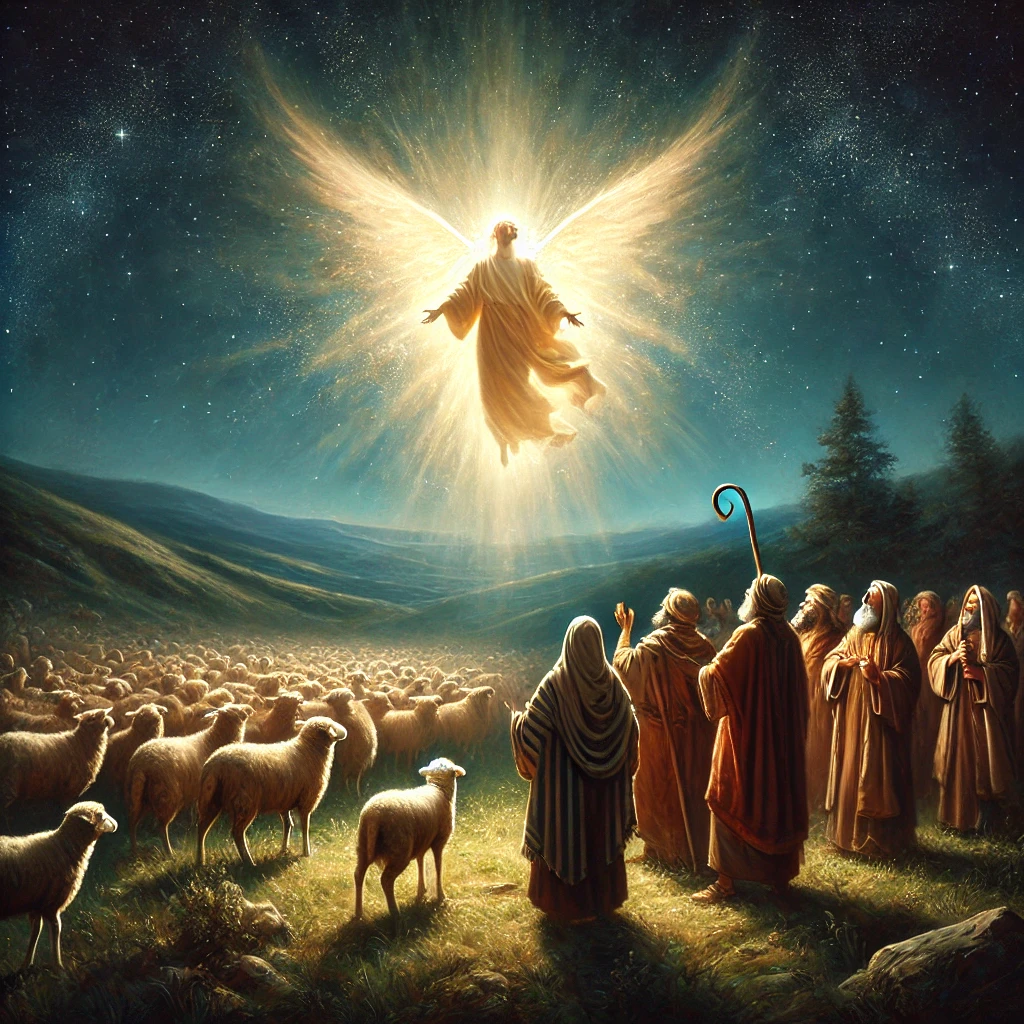
📖 “And there were shepherds living out in the fields nearby, keeping watch over their flocks at night. An angel of the Lord appeared to them, and the glory of the Lord shone around them, and they were terrified.” – Luke 2:8-9
When Jesus was born, God could have announced it to kings, religious leaders, or the wealthy elite. Instead, He chose a group of lowly shepherds as the first to hear the good news. This choice was intentional and deeply meaningful.
The Lowly Status of Shepherds in Ancient Israel
In biblical times, shepherds were considered low-class workers. They spent their days (and nights) out in the fields, tending sheep. Unlike priests or scribes, shepherds weren’t seen as religious authorities—in fact, they were often looked down upon.
✅ Shepherds were considered unclean – Their constant contact with animals meant they couldn’t always keep Jewish purification laws.
✅ They were outsiders – Shepherding was one of the most humble, low-paying jobs in society.
✅ They lived on the margins – Unlike city dwellers, shepherds spent most of their time in the wilderness, away from social or religious institutions.
Why God Chose Shepherds Instead of Religious Leaders
God’s decision to announce Jesus’ birth to shepherds first wasn’t random—it was a powerful statement about the kind of Savior Jesus would be.
✨ Jesus came for the humble, not the proud. The religious elites of the time, like the Pharisees, often looked down on common people. But Jesus’ birth showed that God values humility over status.
✨ Shepherds represent Jesus’ future mission. Jesus later called Himself the Good Shepherd (John 10:11)—one who lays down His life for His sheep. By appearing to shepherds first, God was foreshadowing Jesus’ role as the ultimate Shepherd.
✨ It fulfilled prophecy. Ezekiel 34:23 speaks of God sending a shepherd for His people. This moment in Luke’s Gospel signified that the true Shepherd had arrived.
How the Angelic Announcement to Shepherds Reveals God’s Plan
When the angel appeared, the shepherds were terrified—but the message was one of joy and peace:
📖 “I bring you good news that will cause great joy for all the people. Today in the town of David a Savior has been born to you; He is the Messiah, the Lord.” – Luke 2:10-11
This declaration confirmed three things:
✅ Jesus is the Savior – The One who would save people from their sins.
✅ He is the Messiah – The long-awaited fulfillment of Old Testament prophecy.
✅ He is the Lord – Not just a human king, but divine in nature.
Instead of keeping the news to themselves, the shepherds immediately spread the word. They became the first evangelists!
💡 God’s message wasn’t reserved for the religious or the wealthy—it was for everyone, including the least expected.
4. The Wise Men Weren’t at the Manger
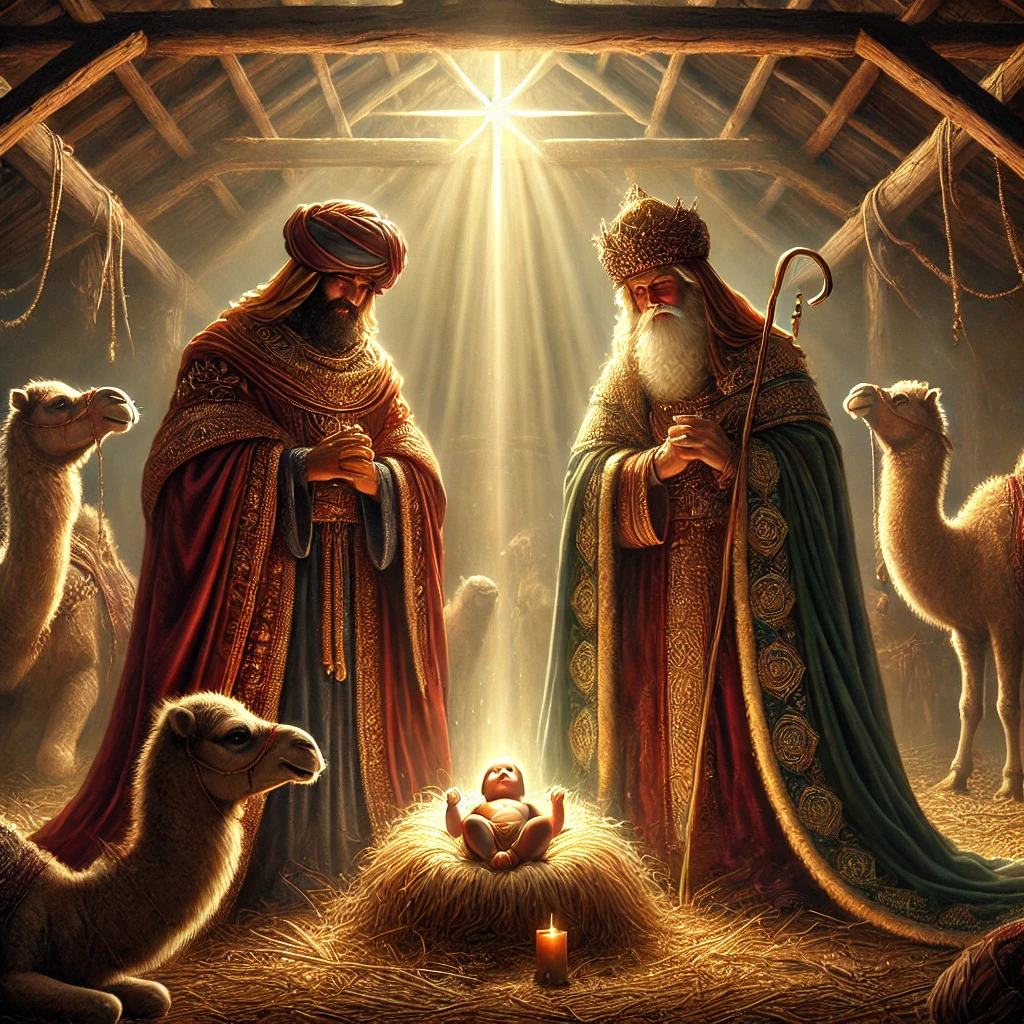
📖 “After Jesus was born in Bethlehem in Judea, during the time of King Herod, Magi from the east came to Jerusalem and asked, ‘Where is the one who has been born king of the Jews? We saw his star when it rose and have come to worship him.’” – Matthew 2:1-2
Many nativity scenes show the three wise men kneeling beside the baby Jesus in the manger. But in reality, the Magi arrived much later—possibly months or even years after Jesus was born!
Who Were the Magi, and Where Did They Come From?
The Bible doesn’t say there were three wise men—only that they brought three gifts. These Magi (also called “wise men”) were likely highly educated scholars from Persia, Babylon, or Arabia. They were experts in:
🔹 Astronomy and astrology – They studied the stars, which is how they noticed the Star of Bethlehem.
🔹 Ancient prophecies – They were likely familiar with Jewish writings, possibly influenced by the prophet Daniel’s teachings.
🔹 Advising kings – They weren’t just travelers; they were respected figures who served in royal courts.
They weren’t Jewish, yet they traveled a great distance to honor Jesus as the “King of the Jews.” This proves that Jesus came not just for Israel, but for the entire world.
The Star of Bethlehem: Scientific & Biblical Perspectives
The Star of Bethlehem is one of the greatest mysteries of Jesus’ birth. What exactly did the Magi see?
Theories include:
🌟 A rare planetary alignment (Jupiter & Venus)
🌟 A bright comet or supernova
🌟 A miraculous event created by God
Whatever the star was, it led them to Jerusalem first, and then to Bethlehem. Unlike the shepherds, who saw angels, the Magi followed a celestial sign—a detail that fits their background in astronomy.
The Symbolic Meaning Behind Their Gifts
The Magi brought three significant gifts, each with prophetic meaning:
✨ Gold – A gift for kings, recognizing Jesus’ royal status.
✨ Frankincense – A gift used in worship, symbolizing Jesus’ divinity.
✨ Myrrh – A burial spice, foreshadowing Jesus’ sacrificial death.
These gifts show that the Magi understood who Jesus truly was—a King, a Priest, and a Savior.
5. Herod’s Massacre: The Dark Side of the Christmas Story

📖 “When Herod realized that he had been outwitted by the Magi, he was furious, and he gave orders to kill all the boys in Bethlehem and its vicinity who were two years old and under, in accordance with the time he had learned from the Magi.” – Matthew 2:16
While Christmas is often seen as a joyful celebration, the story of Jesus’ birth also includes one of the darkest moments in history. King Herod, driven by fear and jealousy, ordered the massacre of innocent children in an attempt to eliminate the newborn King of the Jews.
The Historical Basis for Herod’s Massacre of Innocents
Many people wonder whether this tragic event actually happened. While some ancient records don’t mention it, history paints a clear picture of King Herod’s cruelty.
✅ Herod was a ruthless ruler – He was so paranoid about losing his throne that he murdered his own wife and three of his sons.
✅ Bethlehem was a small town – The number of baby boys killed was likely between 10 and 30, a small enough event to go unrecorded by Roman historians.
✅ Herod’s reputation aligns with this act – Even outside the Bible, Herod is known for committing horrific crimes to maintain his power.
The massacre of the innocent children perfectly aligns with Herod’s character, proving just how desperate he was to eliminate any potential threat to his rule.
The Parallels Between Jesus’ Story and Moses’ Story
This tragedy isn’t just a historical event—it’s a powerful echo of another biblical story.
🌿 Moses and the killing of Hebrew infants – In Exodus 1:22, Pharaoh ordered the killing of Hebrew baby boys to prevent them from becoming too powerful.
🌟 Jesus and Herod’s decree – Just as Moses survived Pharaoh’s orders, Jesus was rescued from Herod’s massacre and later became the ultimate deliverer of God’s people.
This parallel shows that Jesus is the greater Moses, the one who would lead humanity to true freedom—not from Pharaoh, but from sin and death.
How This Part of the Nativity Story Relates to Modern Times
The story of Herod’s cruelty might seem like ancient history, but it reflects a truth that still exists today—there will always be opposition to Jesus.
❌ Some reject Him because they fear losing control.
❌ Others ignore Him because they are too focused on worldly power.
❌ Many still try to erase Jesus from history, just as Herod tried to erase Him from the world.
But no matter how much people oppose Jesus, His kingdom cannot be stopped. Herod failed, and so will anyone who tries to silence the truth of Christ.
💡 Even in the darkest moments, God’s plan will always prevail. And that plan continued as Jesus grew and began His ministry.
6. Was Jesus Really Born on December 25th?
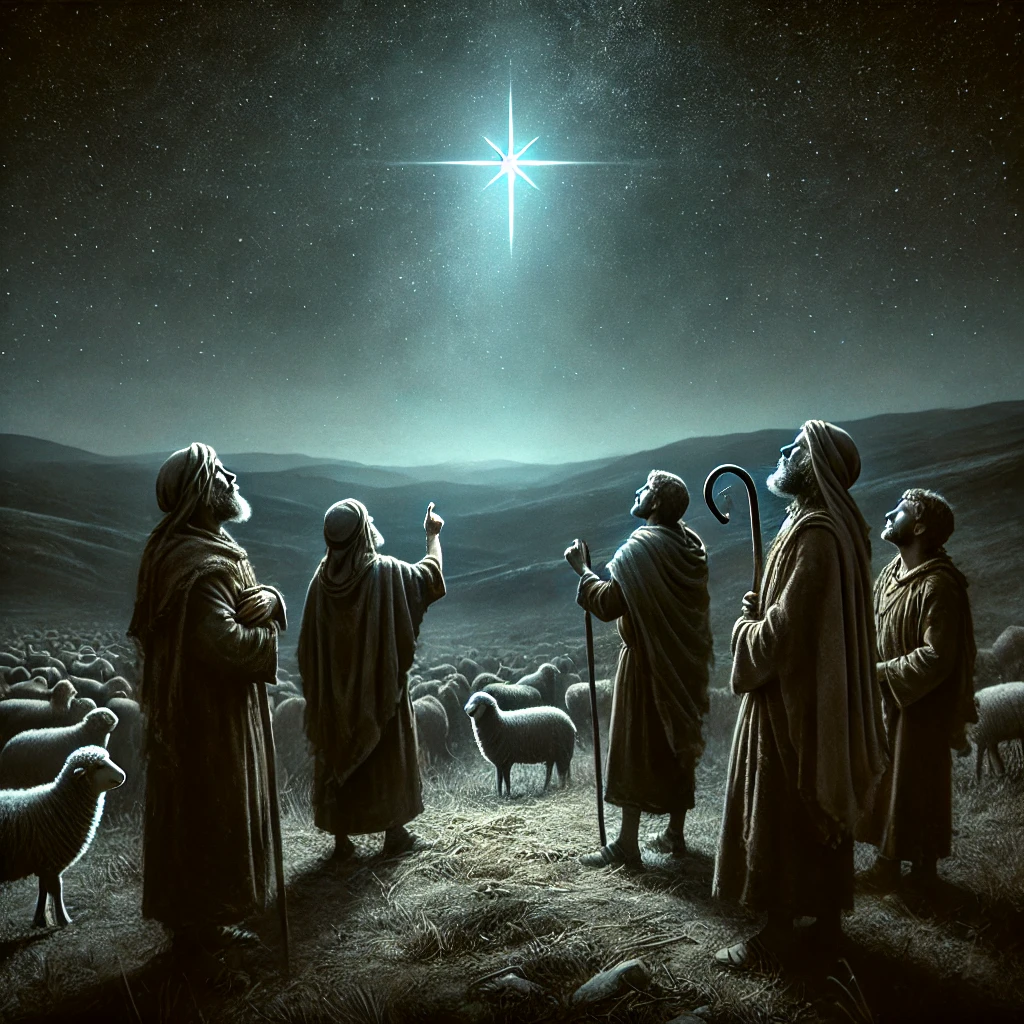
📖 “But you, Bethlehem Ephrathah, though you are small among the clans of Judah, out of you will come for me one who will be ruler over Israel, whose origins are from of old, from ancient times.” – Micah 5:2
Every year, millions of Christians around the world celebrate Jesus’ birth on December 25th. But was that really the day Jesus was born? The answer might surprise you.
The Origins of December 25th as Christmas Day
There’s no Bible verse that tells us Jesus was born on December 25th. So where did the date come from?
✅ Roman Influence – In the 4th century, Christians began celebrating Christmas on December 25th, possibly to counteract the pagan festival of Sol Invictus, which honored the sun god.
✅ Early Christian Writings – Some early Christian scholars attempted to calculate Jesus’ birth based on biblical timelines, leading to the selection of December 25th.
✅ Symbolic Meaning – December 25th falls near the winter solstice, when the days start getting longer. Jesus is the “Light of the World,” so some believe the date was chosen to symbolize the light overcoming darkness.
While there’s no definitive proof that Jesus was born on this day, the date itself isn’t what matters most—it’s who we celebrate that counts.
Alternative Theories About Jesus’ Actual Birth Date
Some scholars suggest Jesus was more likely born in the spring or fall based on clues in the Bible:
🌿 Shepherds in the fields (Luke 2:8) – Shepherds typically kept watch over their flocks at night during warmer seasons, making spring or early autumn more likely than winter.
📅 The timing of John the Baptist’s birth – Based on the timeline of John’s father, Zechariah’s priestly service, some scholars estimate Jesus’ birth to be around September or October.
While the exact date remains uncertain, the good news is we don’t need to know the exact day to celebrate the miracle of Jesus’ birth!
How Different Cultures Celebrate Jesus’ Birth
No matter the exact date, Christians around the world celebrate Jesus’ birth in different ways:
🎄 Western Traditions – Most Western Christians celebrate on December 25th with nativity scenes, gift-giving, and Christmas services.
🌍 Eastern Orthodox Traditions – Many Orthodox Christians celebrate on January 7th based on the Julian calendar.
🇲🇽 Latin American Traditions – Countries like Mexico celebrate Las Posadas, a nine-day reenactment of Mary and Joseph’s journey to Bethlehem.
The diversity of Christmas traditions shows that the heart of the holiday isn’t about a date—it’s about remembering that Jesus, the Son of God, came into the world to save us.
7. Jesus’ Birth Wasn’t Just a Miracle—It Was a Rescue Mission
📖 “For the Son of Man came to seek and to save the lost.” – Luke 19:10
Many people see the birth of Jesus as a beautiful story about a baby in a manger. And while it’s true that His birth was miraculous, it wasn’t just about a baby being born—it was about a divine rescue mission to save humanity.
From the moment He entered the world, Jesus’ life was set apart for a greater purpose. His birth wasn’t simply an event in history—it was God stepping into human flesh to bring salvation to the world.
The Theological Significance of Jesus’ Virgin Birth
The virgin birth isn’t just a fascinating detail in the Christmas story—it’s a foundational truth of the Christian faith.
✅ It fulfilled prophecy – Isaiah 7:14 foretold that the Messiah would be born of a virgin, showing that Jesus’ birth was divinely orchestrated.
✅ It ensured Jesus’ sinlessness – Because Jesus was conceived by the Holy Spirit, He did not inherit the sinful nature of Adam.
✅ It confirmed Jesus’ divine identity – Jesus wasn’t just a good teacher or a prophet—He was fully God and fully man, making Him the only one capable of bridging the gap between God and humanity.
Had Jesus been born like every other person, He wouldn’t have been able to be the perfect, sinless sacrifice for our sins. His miraculous birth set the stage for His ultimate mission—our salvation.
Why Jesus’ Humble Birth Matters for Humanity
Jesus, the King of Kings, could have chosen to be born in a palace with servants attending to Him. Instead, He came humbly, born in a manger, surrounded by animals. This was no accident—it was a message to the world.
✨ Jesus came for the lowly, not the lofty. He wasn’t born among rulers but among shepherds, showing that God’s kingdom is for everyone, not just the powerful.
✨ Jesus experienced the struggles of humanity. By being born into humble circumstances, Jesus understands poverty, hardship, and rejection. He can relate to our struggles because He lived as one of us.
✨ His birth foreshadowed His ultimate mission. From the start, Jesus’ life pointed to His purpose—to seek and save the lost. His humble beginnings reflected His mission to serve, not to be served (Mark 10:45).
His birth wasn’t about glory—it was about grace.
How Jesus’ Birth Set the Foundation for Salvation
The story of Jesus’ birth doesn’t end in Bethlehem. It continues through His sinless life, His sacrificial death, and His glorious resurrection.
✅ Jesus was born to die. The same child laid in a manger would later be nailed to a cross—all for our redemption.
✅ Jesus came to defeat sin and death. His birth signified the beginning of God’s ultimate rescue mission for mankind.
✅ His birth invites us into new life. Because of Jesus, we’re not just celebrating a historical event—we’re celebrating the opportunity for eternal life with God.
💡 Christmas isn’t just about looking back at Jesus’ birth—it’s about embracing the gift of salvation He brought to us.
FAQ: Unveiling More Truths About Jesus’ Birth
As we reflect on Jesus’ miraculous birth, here are some of the most commonly asked questions about this incredible event:
Why was Jesus born in Bethlehem?
- Micah 5:2 prophesied that the Messiah would come from Bethlehem.
- Bethlehem was the City of David, fulfilling God’s promise that the Messiah would come from David’s lineage.
What does the Bible say about Jesus’ birth?
- The nativity story is found in Matthew 1–2 and Luke 1–2.
- Old Testament prophecies about Jesus’ birth are in Isaiah 7:14, Micah 5:2, and Numbers 24:17.
How many wise men visited Jesus?
- The Bible never says there were three—only that they brought three gifts.
- There may have been a larger group of Magi traveling from the East.
Did Jesus’ birth really happen on December 25th?
- The Bible doesn’t specify a date.
- Some scholars suggest He was born in spring or fall, based on historical and astronomical clues.
What is the significance of Jesus’ virgin birth?
- It confirms that Jesus is both fully God and fully man.
- It ensured He was born without sin, making Him the perfect sacrifice for our salvation.
Conclusion: Why Jesus’ Birth Still Matters Today
The birth of Jesus changed everything. It wasn’t just a historical event—it was the arrival of God’s promise to rescue the world.
Jesus’ birth wasn’t just about a baby in a manger—it was the beginning of God’s greatest rescue mission. But His story doesn’t end there. To fully grasp the impact of Jesus’ life, His teachings, and His mission on earth, read our pillar post: 👉 Who Is Jesus? The Truth About His Life and Teachings.
✅ Jesus’ birth fulfilled ancient prophecies, proving that God’s plan had been in motion for centuries.
✅ His humble beginnings remind us that He came for the broken, the outcasts, and the sinners.
✅ His birth was the start of a mission to save the world—a mission that ended in victory over sin and death.
But here’s the most important question:
🎁 Have you accepted the gift of Jesus?
Christmas isn’t just about celebrating the birth of a baby in a manger—it’s about embracing the Savior who came to give us eternal life.
💡 If you haven’t yet put your faith in Jesus, His arms are open wide. His birth was just the beginning—His love and grace are for you today.
🙏 If this article helped you see Jesus’ birth in a new light, consider sharing it with others so they too can experience the beauty of the greatest story ever told.📖 Want to deepen your faith? Check out this related article:
🔗 Why Did Jesus Need to Be Baptized?
Jesus’ Birth Was Just the Beginning—Experience His Heart Today
The birth of Jesus was a world-changing moment, but His life, teachings, and love continue to transform hearts today. Do you truly know Jesus beyond the story of His birth?
In Experiencing the Heart of Jesus, Expanded Edition, Max Lucado takes you on a 52-week journey to go beyond just knowing about Jesus—to truly experience His presence, love, and purpose in your life.
Key Takeaways from This Study:
✅ Discover who Jesus is beyond the nativity story.
✅ Learn how His birth, life, and sacrifice impact you today.
✅ Experience a deeper, more personal relationship with Christ.
Jesus wasn’t just born into this world—He came for you. This study will help you connect with Him in a meaningful way.

